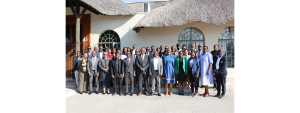 The Parliamentary Standing Committee on Education, Youth, Civic Relations, and Community Development has concluded a weeklong series of in-depth stakeholder consultations in Oshakati (from 28 July until 01 August 2025), aimed at assessing progress, addressing challenges, and exploring policy reforms in key social development sectors. This occasion was officiated by the Honourable Hofni Iipinge, Governor of Oshana Region.
The Parliamentary Standing Committee on Education, Youth, Civic Relations, and Community Development has concluded a weeklong series of in-depth stakeholder consultations in Oshakati (from 28 July until 01 August 2025), aimed at assessing progress, addressing challenges, and exploring policy reforms in key social development sectors. This occasion was officiated by the Honourable Hofni Iipinge, Governor of Oshana Region.
These consultations brought together high-ranking officials, sector experts, and institutional leaders from various Offices, Ministries and Agencies as well as Civil Society Organizations, creating a multi-sectoral platform for constructive dialogue. The engagement reflected the Committee’s mandate to strengthen legislative oversight, inform policy direction, and ensure that education, youth, culture, sports, and community development initiatives align with national development goals and equally highlight critical areas for legislative and policy reforms.
Higher Education and Training Under the Spotlight
The Higher Education and Training fraternity was represented by seasoned academics including Prof. Andrew Niikondo, Deputy Vice-Chancellor: Teaching, Learning and Technology from the Namibia University of Science & Technology (NUST), and Prof. Kenneth Matengu, Vice Chancellor of the University of Namibia (UNAM).
Prof. Matengu outlined UNAM’s strides in enhancing its international standing, pointing to improved global rankings and the growing recognition of its veterinary programme by institutions worldwide. He stressed that such achievements not only strengthen Namibia’s academic reputation but also create new opportunities for international collaboration, research funding, and student exchange programmes. Additionally Prof. Niikondo reaffirmed NUST’s commitment to delivering skills-oriented programmes tailored to Namibia’s socio-economic needs, noting that industry-linked training remains central to producing graduates capable of driving innovation and economic transformation.
Other key contributions in this sector came from Ministry of Education Innovation, Youth, Sports, Arts and Culture, the Namibia Qualifications Authority, the National Council for Higher Education (NCHE), the Namibia Institute of Public Administration and Management (NIPAM) and Namibia Training Authority (NTA), all of whom outlined sectoral challenges ranging from funding constraints to curriculum reforms and research capacity building.
Culture and Heritage Preservation
The Committee received a detailed presentation from Ms. Erica Ndalikokule, Director of the National Heritage Council, who explained the criteria and process for determining and declaring heritage sites. She stressed the importance of heritage preservation as a driver of cultural identity, tourism growth, and historical continuity, and called for more public education on safeguarding national treasures.
Youth Empowerment and Policy Implementation
On youth matters, Mrs. Calista Swartz-Gowases, Director of the National Youth Council of Namibia (NYC), elaborated on the NYC’s role as the executing agency of the National Youth Policy. She stressed the importance of aligning youth development programmes with the policy’s objectives to ensure institutional relevance and measurable outcomes in empowerment, skills training, and entrepreneurship. Mrs. Swartz-Gowases highlighted the need for improved coordination between youth-focused entities and government ministries, noting that duplication of functions could be reduced through better communication and shared frameworks. Additionally, the National Youth Service equally gave insights into their operations and their role in youth skills development and overall role in national development.
International Partnerships and Cultural Cooperation
Ms. Eunice Smith, UNESCO Namibia Country Representative, provided an extensive overview of UNESCO’s work in Namibia. She described the agency as a “laboratory of ideas” and a catalyst for international cooperation in education, science, and culture. Ms. Smith urged Namibia to ratify the Convention on Prohibiting & Preventing the Illicit Import, Export and Transfer of Ownership of Cultural Property, stressing that ratification would help strengthen legal protections for Namibia’s cultural assets.
Sports Development and Infrastructure
The sports sector’s input came from Ms. Kristofine Hangala, Acting Chief Administrator of the Namibia Sports Commission, who reviewed Namibia’s performance at the recent Region 5 Youth Games hosted in Windhoek. Ms. Hangala noted that Namibia continues to excel in individual sports but needs to strengthen its performance in team-based competitions. She also highlighted the legacy projects stemming from the games, including the renovation and upgrading of sports facilities, which she said would have a long-term positive impact on grassroots and elite sports development.
Creative Industries and Protection of Intellectual Property
The music and creative industries were represented by Mr. Albert Nicanor, CEO of the Namibian Society of Composers and Authors of Music (NASCAM). Mr. Nicanor outlined ongoing challenges in collecting royalties from broadcasters and provided an overview of payments made to artists in the past financial year. He reiterated the urgent need for Parliament to fast-track the Copyright Bill, which would modernise the legal framework for intellectual property protection and ensure artists are adequately compensated for their work.
In his closing remarks, Deputy Chairperson Honourable Austin Samupwa commended stakeholders for their openness, professionalism, and commitment to Namibia’s development agenda. “Accountability and transparency are not adversaries of progress; they are the foundation upon which sustainable development is built. Therefore, our oversight role must remain firm yet constructive,” he said. He further emphasised that the inputs gathered during the consultations would be synthesised into a comprehensive report, to be presented to Parliament upon resumption of the House. The insights drawn from these sessions will be pivotal in shaping Namibia’s legislative and policy landscape in the areas of education, youth, civic participation, culture, heritage preservation, sports development, and as well the creative economy.






